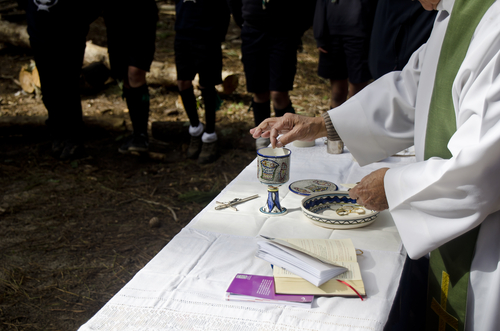“Human beings orchestrate the reflection of God’s glory in the world by clothing material things with sacred meaning.” (Rowan Williams, author, poet, theologian, 104th archbishop of Canterbury).
Parallel this statement of Williams’ with the first lines of Psalm 24, reminding us that “the earth is the Lord’s and all it holds, the world and those who dwell in it,” and we find our pattern for living a liturgical life.
Our task as a people of God is to know ourselves as belonging to God, and to look closely, listen carefully, know integrally, feel deeply that God is in all things and all creatures. This is, in fact, some of what participation in Sunday Mass grows within us. At Mass, through engagement in the actions of our ritual prayer, we practice living in a way that places God’s rule, God’s love, God’s presence at the center of all that we do. Living reverently is the key. “Reverence begins in a deep understanding of human limitations … Simply put, reverence is the virtue that keeps human beings from trying to act like gods” (“Reverence, Renewing a Forgotten Virtue,” Paul Woodruff, Oxford University Press, 2001).
Our penitential rite in the first moments of the Mass is a recognition of our human limitations:
“You were sent to heal the contrite. Lord, have mercy.” To be contrite is to feel sorrow for the ways we have behaved that did not cloth the world with sacred meaning.
“You came to call sinners. Christ, have mercy.” To acknowledge ourselves as sinners is to recognize God as the higher power. To say “I am a sinner” is to subordinate ourselves to God. “Lex orandi, lex credendi” (Latin) is an important liturgical teaching, reminding us that the way we pray is the way we believe. To speak of ourselves as sinners is, therefore, to know ourselves as sinners.
“You are seated at the right hand of the Father to intercede for us. Lord, have mercy.” Christ, interceding for us, places us in the proper context of his same self-emptying humility.
“Do nothing out of selfishness or out of vainglory; rather, humbly regard others as more important than yourselves, each looking out not for his own interests, but [also] everyone for those of others. Have among yourselves the same attitude that is also yours in Christ Jesus, who, though he was in the form of God, did not regard equality with God something to be grasped.”
Refusal to live out this priestly vocation, for Williams, identifies one way to understand sin — “one single and important aspect of sin is the refusal of human beings to undertake this calling, to refuse to act in a ‘priestly’ way…to refuse to bless and give thanks, to refuse the right use of material things.”
We are regularly reminded of the first step to living a liturgical life in the penitential rite at the very start of our liturgy. Living liturgically doesn’t mean just following the rules. It means knowing ourselves as sinners, not grasping equality with God. It means behaving in ways that are rooted in and grow from our understanding of ourselves as belonging to God. It means understanding that in all the moments of our lives we clothe the day with the holiness of God by the way we behave, the manner with which we speak, and the thoughts by which we live. Sunday Mass and living liturgically is about this awareness — knowing ourselves as instruments by which the world is clothed with God’s holiness.
So, Williams' observation of humanity’s vocation, a priestly vocation, is to worship God and to make the holiness of God the center of everything in life. “The liturgy is the source for achieving in the most effective way possible human sanctification and God’s glorification” (Constitution on the Sacred Liturgy, no. 10).
For what other purpose can we possibly be here on the earth? The Second Vatican Council introduced us to this priestly spirit — to not just go to church, but to actually BE the church. We are most church when we participate in the liturgy together, but church is not just on Sundays. It is a way of life, an everyday pattern of liturgical living. We receive the gifts given to us by God; we recognize and remember God’s presence in those gifts, and all around us every day; then we empty ourselves out to the world, sharing ourselves as the embodiment of God’s love.
This is the pattern of the Eucharistic Prayer at Mass: take, bless, break, and share, and this, too, is the pattern of how we are to live: humbly taking, reverently blessing, graciously breaking, and generously sharing God’s presence and love.
Start your day with Always Forward, our award-winning e-newsletter. Get this smart, handpicked selection of the day’s top news, analysis, and opinion, delivered to your inbox. Sign up absolutely free today!

